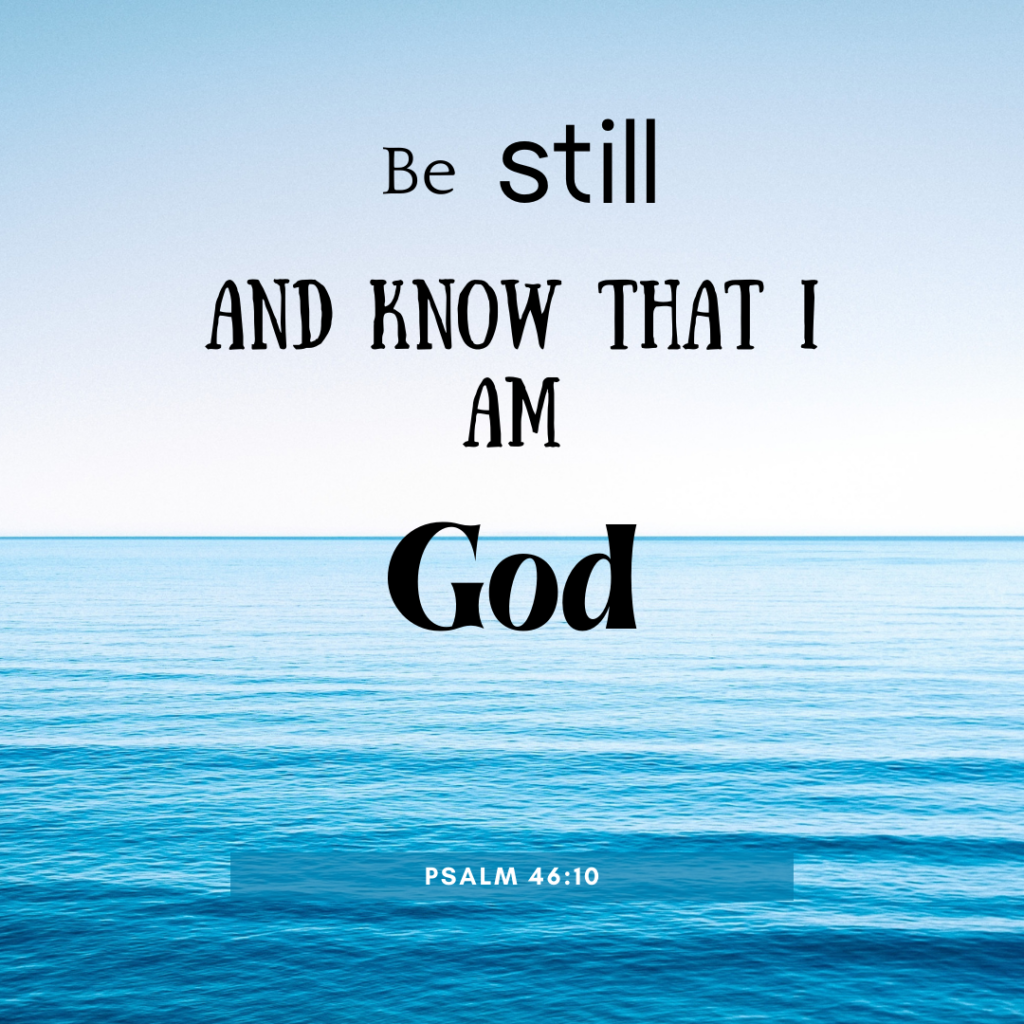Welcome, dear readers, to a reflective journey through the timeless wisdom of Psalm 46. In the hustle and bustle of our modern world, where chaos and uncertainty seem to be ever-present, this ancient text offers a profound message of hope and reassurance. Join me as we delve into the depths of this sacred scripture, focusing on the poignant words, “Be still and know that I am God.”
Psalm 46 opens with a powerful declaration: “God is our refuge and strength, an ever-present help in trouble.” These words set the tone for the entire psalm, reminding us that even during life’s storms, we can find solace and strength in the presence of the Divine. As we navigate the challenges and uncertainties of our world today—from global pandemics to political unrest—it can be easy to feel overwhelmed and powerless. Yet, the psalmist reminds us that God is our steadfast anchor, a source of unwavering support and protection.
The psalmist goes on to paint a vivid picture of chaos and upheaval: “Though the earth gives way and the mountains fall into the heart of the sea, though its waters roar and foam and the mountains quake with their surging.” These words resonate deeply with our own experiences of turmoil and upheaval, whether on a personal or global scale. We are confronted with natural disasters, economic crises, and social injustices that shake the very foundations of our existence.
Amidst this chaos, however, the psalmist offers a simple yet profound injunction: “Be still and know that I am God.” In a world that is constantly in motion, where noise and distraction abound, these words invite us to pause, to breathe, and to reconnect with the divine presence that surrounds us. They remind us that true peace and security are not found in the fleeting comforts of wealth or power but in the enduring love and grace of God.
But what does it mean to “be still” in the midst of chaos? In practical terms, it may involve carving out moments of silence and solitude in our daily lives, away from the incessant demands of work and technology. It may mean turning off our devices, stepping outside, and immersing ourselves in the natural world, where we can experience a sense of awe and wonder at the beauty of creation. It may also involve practices such as meditation, prayer, or simply sitting in quiet reflection, allowing ourselves to be fully present in the moment and in the presence of God.
Earlier this year, I embarked on a retreat at a sprawling ranch in Texas, an experience that profoundly impacted me. One of the highlights of the retreat was a 48-hour isolation journey, a time of profound reflection and spiritual renewal.
The facilitators of the event meticulously marked out individual spaces, each measuring 12 feet by 12 feet, strategically distanced to ensure isolation from fellow participants. Within these confines, we set up our modest tents and prepared for an immersive journey inward.
Stripped of all technological distractions and material possessions, including jewelry like watches, we embraced a minimalist existence. Our sustenance was limited to water and a humble supply of trail mix, as we embarked on a physical and spiritual fast.
For 48 hours, we delved into the depths of solitude, with nothing but our thoughts and emotions for company. Armed with only a journal, we were encouraged to pour out our hearts and minds onto its pages, regardless of coherence or logic.
The experience was both challenging and transformative. Alone with our thoughts, we confronted our innermost fears, doubts, and aspirations. Freed from the noise of the outside world, we found clarity and insight in unexpected places.
As the hours stretched into days, a profound sense of peace descended upon me, a tranquility born of surrender and acceptance. In the absence of external distractions, I discovered a deeper connection to myself and to the divine.
Upon emerging from our solitary sojourn, we were greeted with a renewed sense of purpose and perspective. The retreat offered us a rare opportunity to unplug, unwind, and reconnect with what truly matters in life.
Reflecting on this experience, I am reminded of the importance of carving out moments of solitude and reflection in our busy lives. In the stillness of isolation, we often find the answers we seek and the peace we crave.
I wholeheartedly recommend an experience like this to anyone seeking spiritual growth and renewal. It is a journey worth embarking on, a retreat into the depths of our souls, where we may discover the profound beauty and wisdom that lie within.
In our fast-paced society, the idea of “being still” may seem counterintuitive, even daunting. Yet, as we cultivate the habit of stillness, we may find that it becomes a wellspring of peace and renewal in our lives. In the words of author Anne Lamott, “Almost everything will work again if you unplug it for a few minutes, including you.” When we take the time to disconnect from the noise and chaos of the world, we create space for God to speak to us, comfort us, and remind us of His unfailing love.
Real-life examples abound of the transformative power of stillness during chaos. Consider, for instance, the story of Mahatma Gandhi, who led a nonviolent revolution for independence in India. Despite facing immense opposition and persecution, Gandhi maintained a disciplined practice of daily meditation and prayer, drawing strength from his deep spiritual connection to God. It was in the quiet moments of contemplation that Gandhi found clarity of purpose and unwavering courage to pursue justice and peace.
Likewise, in the field of neuroscience, researchers have discovered the profound effects of mindfulness and meditation on the brain. Studies have shown that regular meditation can lead to reduced levels of stress, increased emotional resilience, and enhanced cognitive function. In a world where mental health disorders such as anxiety and depression are on the rise, the practice of stillness offers a holistic approach to healing and well-being.
In addition to its individual benefits, stillness also has the power to foster greater harmony and understanding in our relationships with others. When we take the time to quiet our minds and open our hearts, we become more attuned to the needs and feelings of those around us. We are better able to listen with empathy and respond with compassion, building deeper connections and fostering a sense of unity and belonging.
Moreover, the practice of stillness can also inspire creativity and innovation in our work and endeavors. Many great thinkers and visionaries throughout history have credited moments of solitude and reflection as the source of their most groundbreaking ideas. When we allow our minds to rest and our spirits to be refreshed, we create space for inspiration to flow and new possibilities to emerge.
In conclusion, Psalm 46 reminds us of the enduring truth that God is our refuge and strength, even in the midst of chaos and uncertainty. The injunction to “be still and know that I am God” invites us to cultivate a deeper awareness of the divine presence in our lives, to find peace and solace in the midst of life’s storms. As we embrace the practice of stillness, may we discover anew the transformative power of God’s love, guiding us through every trial and tribulation.
Share this post: on Twitter on Facebook on Google+
Share via:

